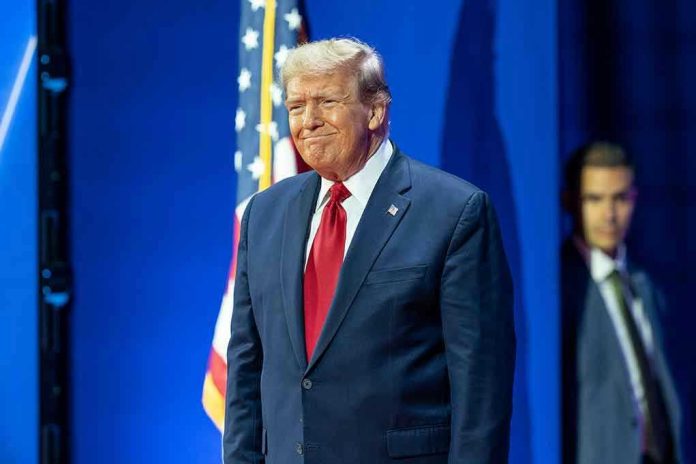
A president threatening to deploy military forces against his own states represents the most dangerous escalation of executive power since the Civil War era.
Story Overview
- Trump threatens to invoke the rarely-used Insurrection Act if states continue blocking his immigration enforcement operations
- Black Hawk helicopters deployed in ICE raids while federal judges split on allowing National Guard deployments
- Illinois and Oregon governors file lawsuits to block federal military intervention in their states
- Legal experts warn this represents unprecedented use of military power for immigration enforcement rather than civil disorder
Military Assets Enter Immigration Enforcement
Black Hawk helicopters now circle American cities as part of ICE operations, marking a dramatic militarization of immigration enforcement. Federal judges in Oregon temporarily halted National Guard deployment in Portland, while an Illinois judge allowed similar deployment in Chicago to proceed. This patchwork of court decisions creates a constitutional crisis where military authority operates under different rules depending on geography.
The 300 Illinois National Guard members called up through Trump’s memo will protect ICE personnel and federal operations, despite fierce opposition from state officials. Governor J.B. Pritzker filed suit to block the deployment, arguing it threatens public safety and inflames community tensions. The stark image of military aircraft conducting domestic law enforcement operations hasn’t been seen since the most turbulent periods of American history.
The Insurrection Act Threat Crosses New Lines
Trump’s willingness to invoke the Insurrection Act of 1807 breaks new ground in presidential overreach. This federal law, designed to suppress rebellion and civil disorder, has never been threatened for immigration enforcement purposes. Previous uses occurred during school desegregation in 1957 and after Hurricane Katrina, situations involving clear public emergencies rather than policy disagreements between government levels.
The president’s exact words carry chilling implications: “If people were being killed and courts or governors were holding us up, I’d do that.” This statement suggests a president willing to deploy military force against state resistance to federal immigration policy. The Brennan Center for Justice warns this represents “a presidential power that threatens democracy,” especially when used to bypass local opposition through military intervention.
Trump threatens use of Insurrection Act as governor says Black Hawks used ICE raid https://t.co/lSVuvbEIOH
— ABC13 Houston (@abc13houston) October 7, 2025
States Fight Federal Military Intervention
The legal battlefield spans multiple states as governors challenge federal authority to militarize their territories. Illinois officials argue that federal deployment occurs without state consent or clear legal justification, creating dangerous precedents for future presidential overreach. Oregon’s successful court challenge demonstrates that judicial oversight still functions, though inconsistently across jurisdictions.
These legal disputes reveal fundamental tensions about state sovereignty versus federal power. When presidents can unilaterally deploy military assets for policy enforcement, the constitutional balance between state and federal authority crumbles. The inconsistent court rulings create a system where presidential military power depends entirely on which judge happens to review the case, hardly the stable legal framework our constitutional system requires.
Constitutional Crisis in Real Time
This escalation represents more than policy disagreement; it signals potential collapse of constitutional governance. The Insurrection Act’s broad language lacks clear limitations, giving presidents dangerous discretion over military deployment. Legal scholars note this ambiguity becomes particularly threatening when presidents face political resistance rather than genuine civil disorder or rebellion.
The immediate implications extend beyond immigration policy to the very nature of American federalism. When military helicopters enforce federal policy against state wishes, we’ve entered territory that resembles martial law more than constitutional governance. The long-term precedent could normalize military involvement in civilian law enforcement, fundamentally altering the relationship between citizens and their government in ways the founders never intended.
Sources:
Brennan Center for Justice – The Insurrection Act: A Presidential Power That Threatens Democracy







